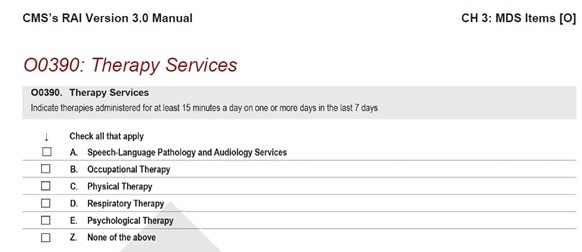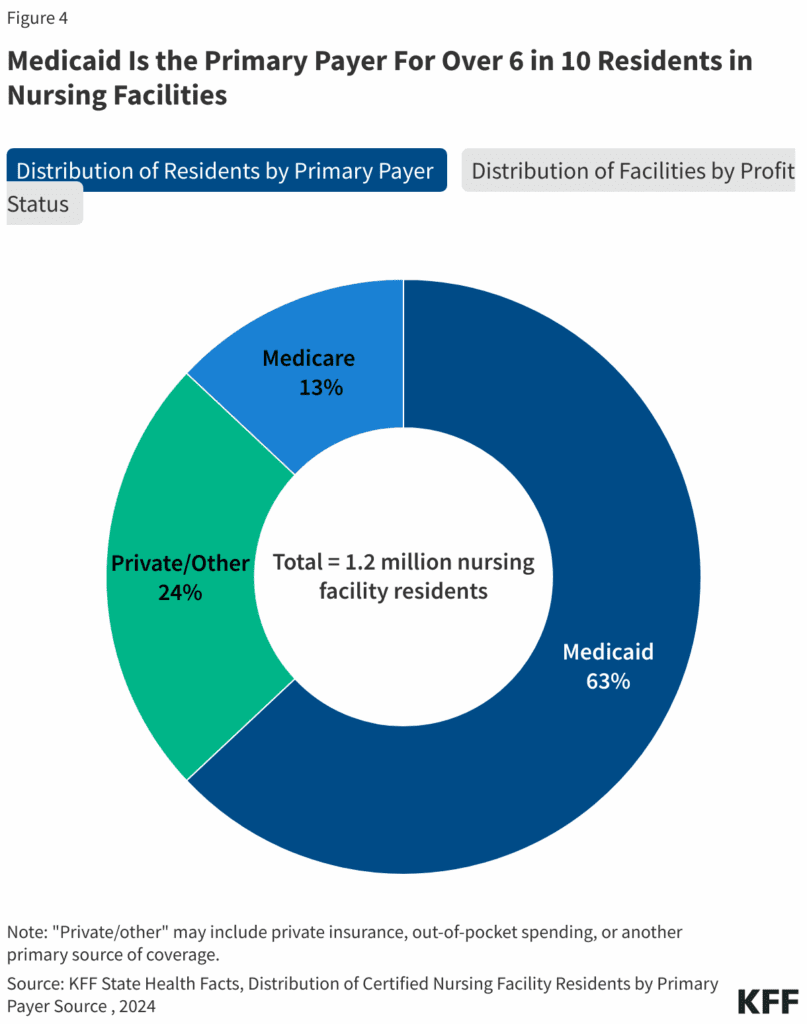
Data collection on the Minimum Data Set (MDS) for “Therapy Services” is changing 10/1/25. These changes impact “all 6” Therapy Services:
- Physical Therapy
- Occupational Therapy
- Speech-Language Pathology
- Respiratory Therapy
- Psychological Therapy
- Recreational Therapy
What is changing?
The entire data collection process for therapy services….
Section O0400, “Therapies,” which includes data collection for Physical, Occupational and Speech Therapy, as well as Respiratory, Psychological and Recreational Therapy, is currently on every type of MDS assessment (OBRA Admission, Quarterly, Annual, Significant Change, PPS 5-Day….) and collects information for all residents, regardless of payor.
This Section includes items all too familiar for therapists such as Therapy Start Date, Therapy End Date, Type or Mode of Therapy (Individual, Group, Concurrent, Co-treatment), Total Days and Total Minutes. Mind you, this is a veteran section, that has been on the MDS for decades.
On 10/1/25, this Section will be removed from all MDSs, along with Section O0420 “Distinct Calendar Days of Therapy.”
One exception from this Section that will remain is: O0400D2 “Respiratory Therapy Days.” This information must remain in order to calculate a PDPM HIPPS Code, or “score,” for all types of MDS assessments. All the other items do not impact a PDPM score.
In last year’s Final Rule, CMS responded to the multiple comments submitted identifying concern with removing these items. CMS indicated these Therapy MDS items are not needed to determine a PDPM HIPPS score and removal of the items decreases the “burden” on those completing the MDS by “6.6 minutes.”
A new therapy question added
Have no fear…. a new question is here!
A new question O0390 “Therapy Services” has been added to all MDS assessments (OBRA Admission, Quarterly, Annual, Significant Change and the PPS 5-Day) to essentially replace the removal of O0400. With this new question, providers will indicate when any of the therapy services listed have been provided for at least 15 minutes on any 1 day during the 7-day look-back window. A simple checkmark is replacing all the prior information collected.
This new item will only tell us if therapy was provided, and does not provide real usable information in terms of therapy frequency, mode, intensity or duration.
The new question looks like this:

Yes, therapy for all non-Medicare Part A residents has essentially been reduced to a checkmark.
A checkmark!
…and with the new question, we lost one of the therapy services.
Let’s take a moment of silence to remember Recreational Therapy, as they did not “make the cut,”, and will no longer be represented on the MDS. We feel for you.
How will therapy service details be monitored going forward?
Well, for residents in a non-Medicare Part A assessment period, essentially, other than the “checkmark” discussed above, there will be no monitoring OR data collection.
For Medicare Part A residents, however, a portion of the data collection will remain. Though therapy data will no longer be collected on the 5-Day PPS assessment, including Therapy Start Date, Days, Minutes, Mode of Therapy, Calendar Days, other than the checkmark, data collection is in place on the Medicare Part A Discharge MDS.
The Section O0425, Part A Therapies, will remain “as is” for Medicare Part A, and will continue to collect total Therapy Days and Minutes (including Individual, Concurrent, Group and Co-treatment), as will Section O0430: Distinct Calendar Days of Part A Therapy, though ONLY on the Medicare Discharge MDS (End of PPS).
Together, this information calculates the amount and type of therapy provided over the course of a Part A stay, and will be used to track the % of Group and Concurrent services to monitor SNFs over the 25% threshold. With this information, CMS can also determine if therapy services were provided less than 5 days per week, and the average amount of minutes provided per day.
This information is currently collected at the start (PPS 5-Day) and end (PPS Discharge) of a Medicare Part A stay. On 10/1/25, it will only be found on a Medicare Part A Discharge MDS...
This is what these Sections currently (and after 10/1/25) look like:


Just to make sure this hit home…..
This level of detail will be collected by CMS for Medicare Part A residents only… and at discharge from Part A only.
For all other residents, which are the majority in the SNF setting, the details about therapy delivery, going forward, will need to be obtained from your in-house or contract therapy group. SNF administrators will not know, for example, the average therapy session length, if therapy was provided in a group or individual session, or the duration of the therapy intervention unless that information is provided by the therapy staff.
A big deal?
Faced with this upcoming shift in therapy data collection, what could possibly be the rationale behind discontinuing a Section that has been on the MDS for over 25 years that provides valuable data about therapy services for the majority of residents in the SNF? Wouldn’t CMS want data for non-Medicare Part A residents for comparison or reference?
Yes, therapy information will still be collected for Medicare Part A stays, but these residents only make up a small percent (13%) of the 1.2 million residents in SNFs throughout the country, as identified here by KFF. The “M” in CMS stands for Medicare & Medicaid, and even though Medicaid reimbursement is determined at the State level, wouldn’t the data be beneficial? Right now each MDS identifies the Therapy Start and End Date for each resident’s last therapy episode. This type of information is helpful for providers to track trends.

Those who are saying “no big deal” clearly do not understand how this Section of the MDS drives therapy “action” in many states and has NOTHING to do with how therapy is or isn’t reimbursed by Medicaid, and EVERYTHING to do with how SNFs are reimbursed by their state for residents with Medicaid as the primary payor (including dual-eligible residents.)
What are “we” losing with these changes?
These pending changes come with a loss of therapy information for all residents in your SNF, whether they are there for short term rehab or long-term care.
Just a few examples:
- For all admissions, regardless of payer, we won’t know exact details of therapy provision in that first week of admission, where now we can at least see the therapy start date, intensity and modes provided on the Admission or 5-Day MDS. Did therapy start on Day 1 of admission, or Day 7? The answer won’t be on the MDS. Let’s hope Medicare Part A start dates are not delayed as this may impact skilled coverage. For that info, you will have to ask therapy.
- There will be no way to compare and contrast the therapy service details for a Medicare Part A resident with any other payor type from the MDS. Is there a difference in the details when comparing what Medicare Part A residents vs Managed Medicare residents receive? For that info, you will have to ask therapy.
- With the “checkmark” indicating whether therapy was provided at least 1 day for 15 minutes in the MDS look-back period, you will not know if the resident was on a true therapy program and deserved that checkmark, or was not placed on therapy but received an “evaluation only” which included treatment minutes that would falsely trigger the checkmark. For that info, you will have to ask therapy.
- When reviewing your Quality Measure triggers for a particular MDS, such as Pressure Ulcers, Ability to Walk Independently Worsened, and/or Need for Help With ADL’s has Increased, correlating changes in these areas to the presence of or absence of therapy services at the time will not be possible from the MDS alone. For that info, you will have to ask therapy.
Most “doing the work” would agree that continuing to input this valuable info would be worth our 6.6 minutes!
what’s next?
With these changes comes the opportunity that all SNF therapy professionals should take…
Read the “new” 22-page Therapy Section of the RAI Manual, currently in draft form. The 1st 14 pages contain new or revised information and the remaining 8 pages outline the rules for therapy data collection for Medicare Part A residents that are currently in place.
This should be information all therapy staff are well versed in. There are billing and coding examples for all payors, and definitions for all the therapy services provided in the SNF setting. Most of this information has always been there… now is the time to read it.
In addition to explaining the changes to come 10/1/25 to your therapy staff, download or print the 22 pages of instructions for the new Therapy Section and have them read the information. Make it part of your compliance program training.
If you have any questions, send them to our Just Ask Q&A Team and we will get your questions answered.
Thank you for all you are doing to provide the best care to the geriatric population!
In your corner,
Dolores
Dolores Montero, PT, DPT, RAC-CT, RAC-CTA
President | Montero Therapy & MDS Resource Team
MonteroTherapyServices.com
